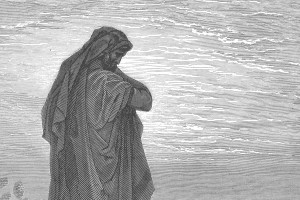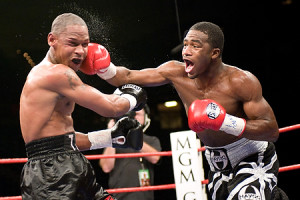Disclaimer: After posting my initial critique of the biblical manhood movement last week, I received a number of responses. It appeared to at least one commenter that I was ungrateful for what the men I had critiqued were doing to help recover a vision for biblical manhood in the church. Before I delve into my critique any further, I want to be very forthright in saying that I am grateful for what many authors in the movement—Mark Driscoll and Al Mohler included—have done in pointing out what biblical manhood looks like. I have personally benefited tremendously from the writings of these men. I don’t want that to be lost on this discussion. Additionally, I hope that my critique only serves to make the church more faithful in her calling to be gospel centric, especially when it comes to the issues of manhood. If it fails to do such, then may my critique be ever forgotten in the minds of men.
In my previous post I argued that the biblical manhood movement was illegitimately applying observations about the way in which men act in the world to the way in which men act in the church. I framed the issue by arguing that in the biblical manhood literature there is no distinction between the men of the church and the men of the world. I further stipulated that this seamless transposition has gone uncritically accepted for far too long and that there is a number of theological, practical and pastoral side effects from framing the discussion in such a way. In this current post, it is my aim to address the theological side of the discussion. Though many are clamoring for me to address the sociological data, I have to lay a theological framework through which I will critique the sociological data in next week’s post.
Among the loudest voices in the biblical manhood movement are, Mark Driscoll and Al Mohler. In their writings, one can see how they conflate the issues of the unregenerate man with the regenerate man (see last week’s post for evidence). Yet if one were to read either of these authors on the nature of conversion, they both explicitly reveal their belief that true conversion results in true life change. Their understanding of conversion is entirely biblical and thus, entirely accurate. This understanding is exactly what the apostle John argues for in 1 John when he states, “Whoever says ‘I know him’ but does not keep his commandments is a liar, and the truth is not in him, but whoever keeps his word, in him truly the love of God is perfected. By this we may be sure that we are in him: whoever says he abides in him ought to walk in the same way in which he walked.” (1 John 2:4-6). In this passage we see that those who truly know God will have a desire to “keep his word.” Yet if these authors hold John’s understanding of conversion then why do they paint the picture of men in the church as being given over to TOTAL worldliness? In case there was ever a doubt as to how bleak of a picture is being painted by these authors, listen to Driscoll yet again in his article “The World is Filled With Boys Who Can Shave,” when he states:
You’re the glory of God. What does it mean to be a man? John is a great example. He doesn’t waste his teens and his 20s downloading free porn, racking up his credit card debt, spending seven years to knock out his undergrad degree, trying to be the king of the fantasy football or baseball league, determined to pound more beers at happy hour and conquer more women than all the other guys to show he’s a real man. That’s no man at all. It’s a boy who could shave.
.
All of this is against the backdrop in which he is supposedly encouraging Christian men to be biblical men. His language here is an appalling overstatement. Are the “Christian” men he is counseling really out trying to “conquer more women than all the other guys?” I put Christian in quotation marks because if these are the men he is counseling, then perhaps he should start more consistently applying his own theology of conversion by questioning whether these men are even saved in the first place. Is it possible that the biblical manhood movement is talking to men who show up to church but are no more Christian than the most avid atheist? In sum, I am saying that if these authors applied their own theology of conversion to the manhood discussion, it would stop them from painting such a bleak picture about the truly regenerate men of the church.
The apostle John is not the only one who describes what true conversion looks like. We find nearly identical ideas about conversion from Jesus himself when he states, “So, every healthy tree bears good fruit, but the diseased tree bears bad fruit. A healthy tree cannot bear bad fruit, nor can a diseased tree bear good fruit” (Matthew 7:17-18). While Jesus is addressing false prophets here, the principle can generally be applied to anyone who claims to be an orthodox believer. The principle is also corroborated in countless other texts (Mt 12:33-35; Lk 6:43-45). If Jesus says that good trees with bad fruit is a spiritual impossibility, then why does the biblical manhood movement seem to be speaking to good trees with very bad fruit?
Unfortunately, conversion is not the only theological issue at stake in this discussion. The doctrine of sanctification, specifically as it relates to the promises of God, is also in view. Paul tells us in the book of Philippians that, “… it is God who works in you, both to will and to work for his good pleasure” (Philippians 2:13). We are told that God is at work in believers. No matter how little or how slow the sanctification process seems, Paul can be confident that God will finish the work that he started (Phil 1:6) because he knows that it is God doing the work. Thus even when man fails at his role in sanctification, God NEVER fails on his end. We see similar ideas laid out in Romans as well when Paul states, “For those whom he foreknew he also predestined to be conformed to the image of his Son, in order that he might be the firstborn among many brothers” (Romans 8:29). Again, we can see that God is in the process of transforming his own. More then that, it is predestined that they be conformed to his image. Part of the sanctification process is for men to be formed into biblical men. Nowhere in either of these passages is there an exception clause for biblical manhood issues. However, when reading literature from the movement, it seems as though God forgot to sanctify men when it comes to being a biblical man. Based on the way in which they describe the situation it starts to look as though the promises of God have failed. And though I don’t believe the authors realize this problem when they construct the issue in such fashion, it is no small matter.
The upshot of posing the issue in such a way that the promises of God seem to have failed is that the authors come dangerously close to giving off an appearance that God is unfaithful to those he redeems. One passage strikes me as particularly relevant to the topic. In Ezekiel, we are told why God decided to spare the Israelites:
Then I said I would pour out my wrath upon them and spend my anger against them in the midst of the land of Egypt. But I acted for the sake of my name, that it should not be profaned in the sight of the nations among whom they lived, in whose sight I made myself known to them in bringing them out of the land of Egypt… Moreover I swore to them in the wilderness that I would not bring them into the land that I had given them…. because they rejected my rules and did not walk in my statutes… Nevertheless, my eye spared them, and I did not destroy them or make a full end of them in the wilderness (Ezekiel 20:8b-9, 15-17).
Here we can see that God followed through on his promises to the Israelites for his own name’s sake; so that his own name would not be profaned amongst the nations. God also describes similar motivations for sparing Israel in other parts of the Old Testament as well (Isa 48:9-11). The cutting off of God’s people from his promises would have been great cause for derision of his name. This is no less the case today. If it appears that God’s men have been cut off from the promises of sanctification, what is the world to think? My fear is that when the writers in the biblical manhood movement describe such a dim picture of men in the church, it begins to give off an appearance that the promises of God have failed and this in turn hands the world a loaded weapon to profane the name of God.
Some will argue at this point that I need to address the sociological issues. I will do that next week. However, based on all the theological issues that I have addressed so far, I would say there is a compelling case for disbelieving the way the case has been framed in the biblical manhood literature. I simply can’t believe that then men in the church (and by that, I mean those who are truly saved) look like the world because I know that true conversion creates a new life (2 Cor 5:16-17). I simply can’t believe that men in the church look identical to the world because I believe God is faithful to sanctify his own. I simply can’t believe that men in the church are given to total worldliness because I believe that God is faithful to his promises. I simply can’t believe it because the Bible tells me otherwise.





 to a sociological one. It is true that the last two centuries have unfortunately turned HUMANE matters into SCIENTIFIC ones. After teaching social sciences (psychology, sociology, and anthropology) for the last few years, it is my overwhelming belief that the humanities (grammar, rhetoric, logic, as well as philosophy and theology) are far better suited to deal with the problem you have outlined. Augustine and Aquinas would have both thrown up in their mouths a little bit if he would have seen us QUANTIFY the human condition rather than QUALIFY it. That being said, my previous request for sociological data was one of convenience to your argument rather than laying an appropriate groundwork. My apologies for my lack of patience.
to a sociological one. It is true that the last two centuries have unfortunately turned HUMANE matters into SCIENTIFIC ones. After teaching social sciences (psychology, sociology, and anthropology) for the last few years, it is my overwhelming belief that the humanities (grammar, rhetoric, logic, as well as philosophy and theology) are far better suited to deal with the problem you have outlined. Augustine and Aquinas would have both thrown up in their mouths a little bit if he would have seen us QUANTIFY the human condition rather than QUALIFY it. That being said, my previous request for sociological data was one of convenience to your argument rather than laying an appropriate groundwork. My apologies for my lack of patience.
32 Comments
Leave your reply.